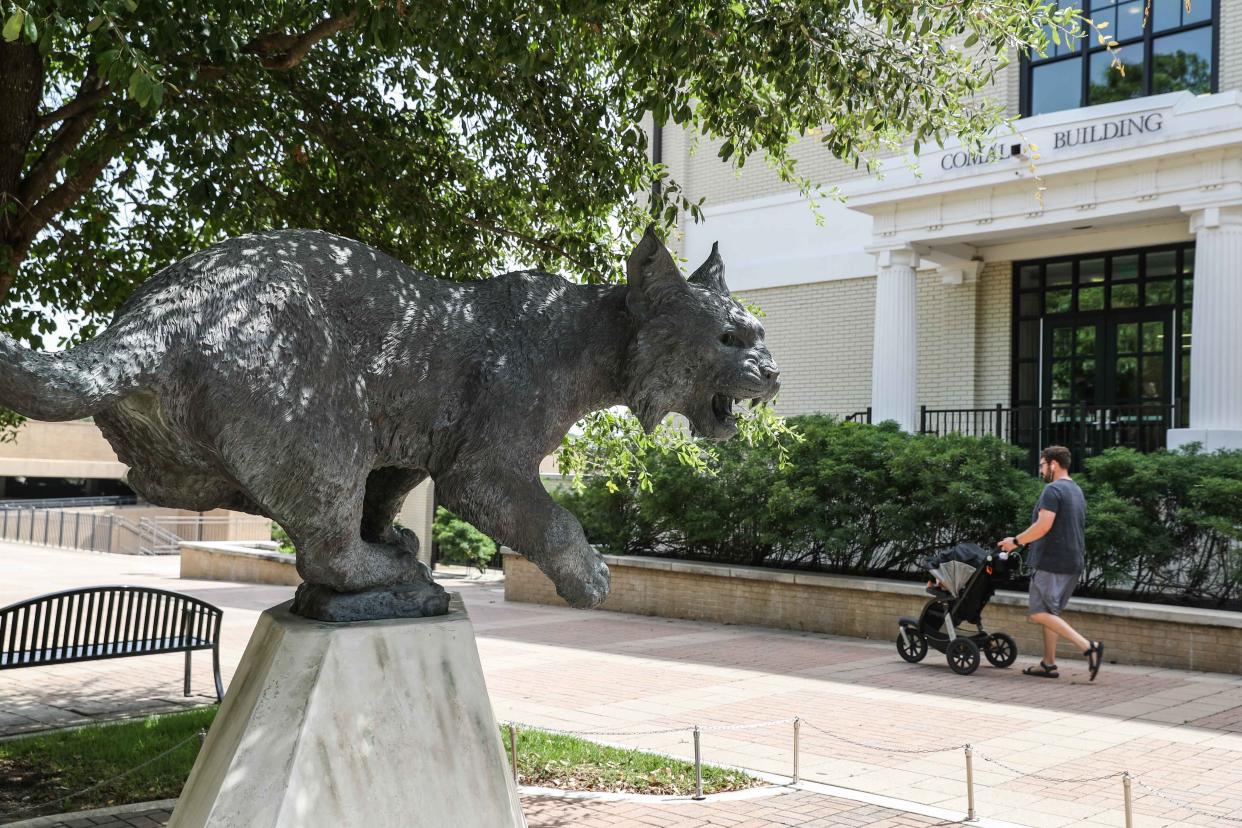Lawsuit: Texas State harassment, computer policies violate students' free speech rights

A free speech advocacy group has sued Texas State University, saying the school’s harassment and computer policies violate students’ First and Fourteenth Amendment rights.
Speech First, a Washington-based nonprofit, argues that the two policies are deterring, suppressing and punishing the constitutionally protected speech of students at the university in San Marcos, according to the lawsuit, filed in federal district court Thursday.
The suit names several top officials as defendants, including Texas State University System Chancellor Brian McCall, Texas State University President Kelly Damphousse and all the members of the system's Board of Regents.
Texas State’s harassment policy prohibits “unwelcome verbal, written, graphic, or physical conduct” that is “sufficiently severe or pervasive” and directed at people based on their race, sex, gender and other demographic factors.
More: Professor critical of equity efforts accuses UT in lawsuit of violating free speech rights
According to the suit, the policy is chilling protected speech of students who attend Texas State and is deterring them from “expressing views that are outside the mainstream about the political and social issues of the day.”
A separate university policy prohibits students from using “informational resources” to “affect the result of a local, state, or national election.” The group argues that the policy prohibits students from using their university email accounts to send messages with a “political purpose” and thus is a “vague, content-based, and overbroad restriction of protected speech.”
The university policy cites a Texas law that prohibits state employees, including public university employees, from using their official authority to “interfere with or affect the result of an election or nomination of a candidate or to achieve any other political purpose.”
Texas State spokesperson Jayme Blaschke and Mike Wintemute, spokesperson for the Texas State University System, said the school was reviewing the complaint and had no further comment.
More: Texas Supreme Court rules that universities can revoke degrees for academic misconduct
The suit claims that three students — referred to as Student A, B and C — are “suffering concrete injuries” due to the harassment policies and “credibly fear that the expression of their deeply held views is prohibited,” so they aren’t speaking as freely as they otherwise would.
According to the suit, the three students have “politically conservative” views, including that abortion is a “grave evil,” that affirmative action is “old-fashioned racism” and that some people claim certain gender identities for attention. They fear that sharing these beliefs will be considered “harassment” under the university’s policies, the suit argues.
They also are refraining from sending political emails to other students from their university email addresses because they're afraid they will be punished under the campus computer policy, according to the complaint.
Cherise Trump, executive director of Speech First, said in a statement that the university’s policies are “clearly designed to deter and restrict student speech” by limiting free expression and the exchange of viewpoints on campus.
More: House, Senate panels OK measure to form Texas University Fund, allot billions to research
“Texas State administrators have created a campus controlled by fear where students are afraid to share their opinions, engage their classmates, or even posit new ideas,” Trump said. “By violating their students’ First and Fourteenth Amendment rights, Texas State claims they’re protecting students. How can Texas State claim to protect students while violating their rights?”
The suit asks for the court to ban the university from enforcing the named policies and rule that the policies violate students’ constitutional rights.
Speech First previously sued the University of Texas in 2018, arguing that several of the school’s policies, including on verbal harassment, violated students' First Amendment rights.
UT eventually amended or removed some of its policies and, as part of a settlement in the case, discontinued its Campus Climate Response Team, which was created to help students report hateful comments, prejudiced behavior and other incidents of alleged bias.
This article originally appeared on Austin American-Statesman: Advocacy group: Texas State violating First Amendment rights

